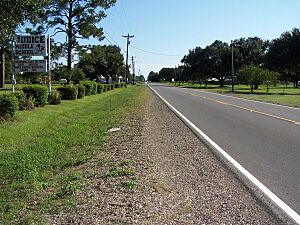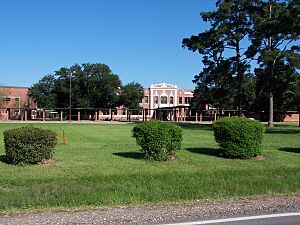Judice, Louisiana facts for kids
Quick facts for kids
Judice, Louisiana
|
|
|---|---|

Downtown Judice
|
|
| Country | United States |
| State | Louisiana |
| Parish | Lafayette |
| Area | |
| • Total | 8.9 sq mi (23 km2) |
| • Land | 8.9 sq mi (23 km2) |
| • Water | 0.0 sq mi (0 km2) |
| Elevation | 36 ft (11 m) |
| Time zone | UTC-6 (CST) |
| • Summer (DST) | UTC-5 (CDT) |
| Area code(s) | 337 |
Judice is a small, unincorporated community in Lafayette Parish, Louisiana, United States. Being "unincorporated" means it's not a separate city or town with its own local government. Instead, it's managed as part of the larger parish (like a county).
History of Judice
The area we now call Judice was first known as "Foreman Flats." This original area stretched from Ridge Road in the north to Doc Duhon Road in the south. It also included Lagneaux Road in the east and South Fieldspan Road in the west. Today, Judice is generally found between W. Congress Street and Johnston Street.
Early Settlers and Their Lives
The first known settler in this area was Edward G. F. Broussard. He arrived in 1858 and bought about 160 acres of land. Other early families came from states like Georgia, South Carolina, and North Carolina.
One of the early settlers, John C. Smith, owned enslaved people. After slavery ended, many of these individuals chose to stay on the land. They worked as tenant farmers, meaning they farmed the land and paid rent, often with a share of their crops. Their families continue to live in the Judice area even today.
How Judice Got Its Name
Around 1900, more and more children needed schools. To help with this, three new schools were built: the Burke School, Alex Broussard School, and Alcide Judice School. These new buildings replaced the smaller, one-room schools that were spread out across the parish.
Later, during a tough economic time called the Great Depression in the 1930s, land owned by Gerard Foreman was taken over to build a new school. This school was named Judice High School. It was named after Alcide Judice, who was a successful businessman and a political activist. A political activist is someone who works to bring about social or political change. Alcide Judice was known for helping to improve education in the parish. Because of the new school, people soon started calling the entire area "Judice."
Judice Today
Even today, Judice remains a mostly rural area. This means it's still largely countryside, not a big city. Farming is still a very important part of life here.
Farmers in Judice mainly grow rice and raise crawfish. You can also find dairy farms, where milk is produced. Some land is used for oil and mineral leases, which means companies pay to extract resources from the ground. Horse training is another activity that takes place in the area. The name "Judice" is also a very common family name throughout Louisiana.
 | Jackie Robinson |
 | Jack Johnson |
 | Althea Gibson |
 | Arthur Ashe |
 | Muhammad Ali |




